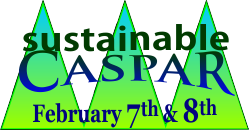 |
 |
|
F R I D A Y
7 February 2014 |
Preconference Panel
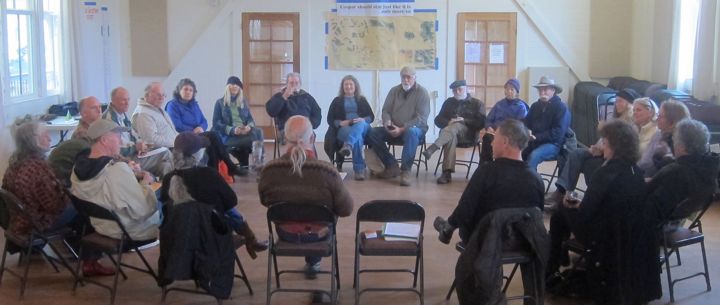
|
Potluck Dinner & Conversation |
Keynote: Asher Miller
Executive Director of the Post Carbon Institute and co-author of the important paper Climate After Growth spoke about sustainable communities in the post carbon future. |
| |
S A T U R D A Y
8 February 2014 |
Whole-System Overview Panel
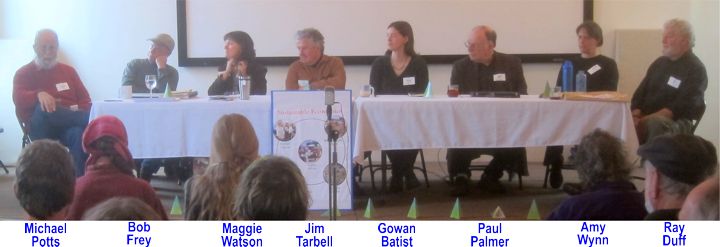 |
|
Collating and Recording Findings |
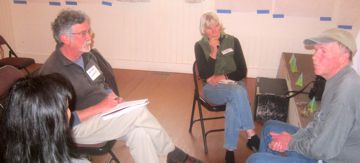
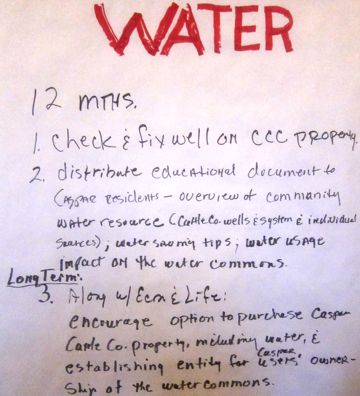 |
Water
facilitator: Bob Frey
12 Month:
- Check & fix well on Community Center property
- Distribute educational document to Caspar residents: overview of community water resource (CattleCo. Wells & system, individual sources; water saving tips, water usage impact on water commons
Long-Term:
- Encourage option to purchase CattleCo property, including water, and establishing entity for Caspar users' ownership of the water commons.
|
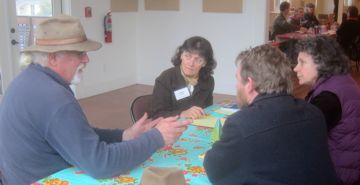
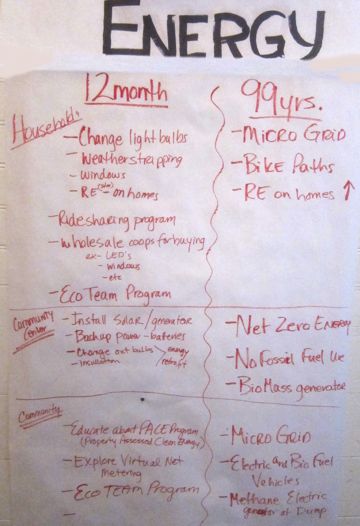 |
Energy
facilitator: Maggie Watson
12 Month:
- Households:
- change lightbulbs
- weatherstripping
- windows
- Renewable Energy (solar) on homes
- Ridesharing program
- Wholesale coops for buying – examples: LEDs, windows. Eco-team program.
- Community Center: Install solar/generator, Back-up power (batteries), Energy retrofit (change out bulbs), insulation.
- Community: Educate about PACE program (Property Assessed Clean Energy); explore virtual; net metering; Eco-team program.
Long-Term:
- Households: Micro-grid, bike paths, more Renewables on homes.
- Center: Net Zero Energy, no fossil fuel use, bio-mass generator (for kitchen and heat).
- Community: Micro-grid; electric and bio-fuel vehicles. Methane Electricity generation at the "Dump".
|
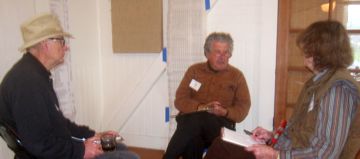
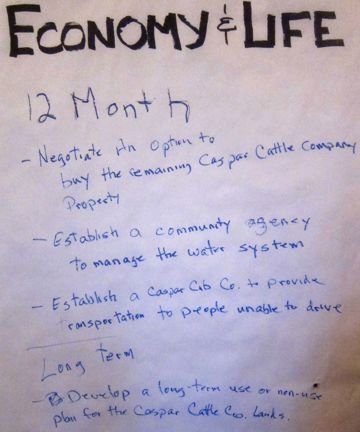 |
Economics & Livelihood
facilitator: Jim Tarbell
12 Month:
- Negotiate an option to buy the remaining CattleCo. Property
- Establish a Community Agency to manage the water system
- Establish a Caspar Cab Company to provide transportation for people unable to drive
Long-Term:
- Develop a long-term use / non-use plan for the CattleCo. lands
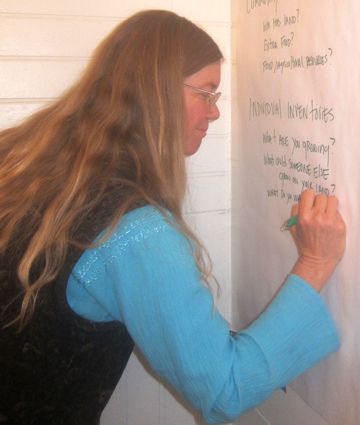
|
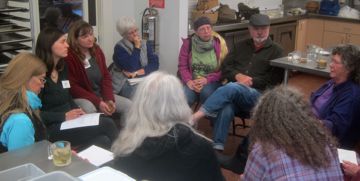
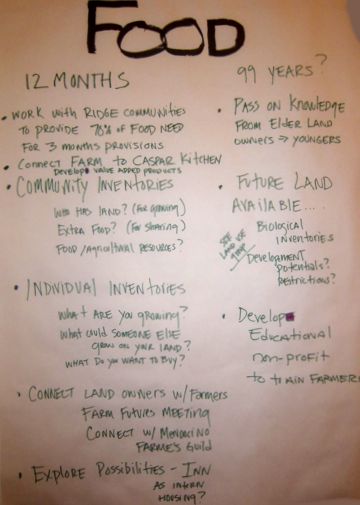 |
Food
facilitator: Gowan Batist
12 Month:
- Work with ridge communities to provide 70% of food need for 3-month provisions
- Connect Farm to Caspar Kitchen, develop value-added products
- Community Inventories: who has land? (for growing); Extra Food? (for sharing); Food/Agricultural Resources?
- Individual Inventories: What are you growing? What could someone else grow on your land? What do you want to buy?
- Connect land-owners with farmers; Farm Futures meeting, connect with Mendocino Farmers' Guild
- Explore possibilities with Caspar Inn – Intern/Farmer housing?
Long-Term:
- Pass along knowledge from elder land-owners to youngers
- Future land available: biological inventories; development potentials? Restrictions? See Land Use notes.
- Develop educational nonprofit to train farmers
|
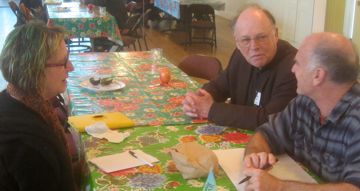
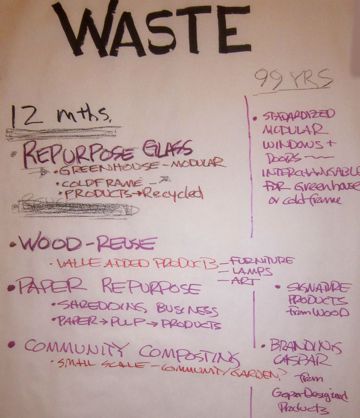 |
Waste
facilitator: Paul Palmer
12 Month:
- Repurpose glass: greenhouse (modular design), coldframe. Recycle products.
- Wood re-use: value added products (furniture, lamps, art)
- Paper re-purpose: shredding business papers, paper to pulp to products
- Community Composting: small scale, at the Community Garden?
Long-Term:
- Standardize modular windows and doors, making them interchangeable for greenhouse and coldframe
- Signature products from wood
- Branding Caspar from Caspar-designed products
|
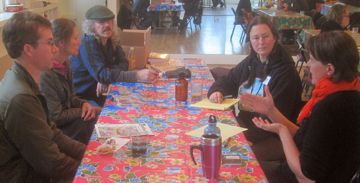
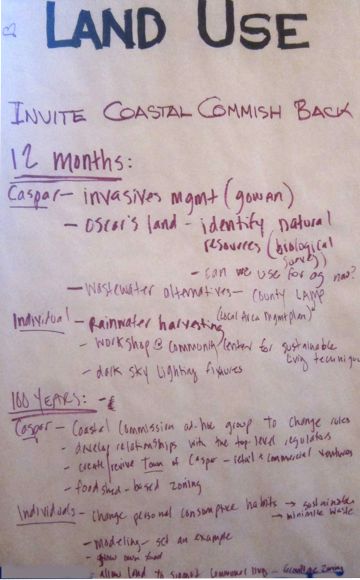 |
Land Use
facilitator: Amy Wynn
12 Month:
- Community
- Invite the Coastal Commission to return
- Invasives Management (Gorse, Gowan's sheet-mulching technique?)
- CattleCo land: identify natural resources (biological survey). Can we use for ag now?
- Wastewater alternatives -- County LAMP (Local Area Management Plan)
- Household
- Rainwater Harvesting
- Workshop at Center for Sustainable Living Techniques (reskilling)
- Dark sky lighting awareness, fixtures, consulting
Long-Term:
- Community: Coastal Commission ad hoc group to change rules; develop relationships with top-level regulators; create revive Town of Caspar (retail and commercial ventures); foodshed based zoning
- Households: Evolve personal consumptive habits toward sustainability and minimized waste; modelling – set an example; grow our own food; allow land to support communal living – ecovillage zoning
|
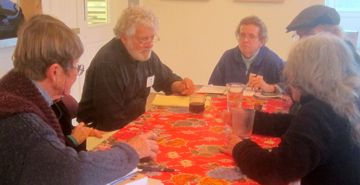
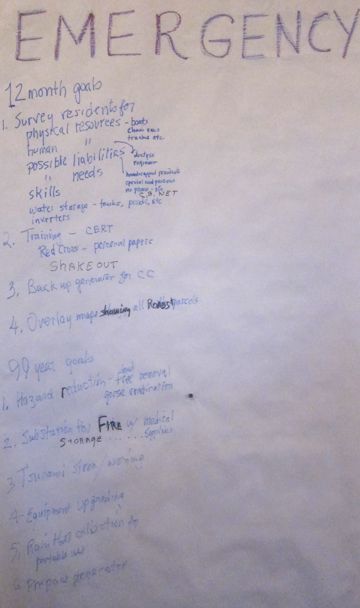 |
Emergencies
facilitator: Ray Duff
12 Month:
- Survey residents for physical resources (boats, chainsaws, trucks, etc.), human resources (doctors, engineers), possible liabilities and needs (handicapped residents, special needs persons, no phone, etc.), skills, water storage (tanks, ponds, etc.), inverters, generators.
- Training (CERT, Red Cross – personal papers) Shakeout
- Back-up solar / propane generator for Center
- Overlay maps showing all roads and parcels
Long-Term:
- Hazard reduction: dead tree removal, gorse eradication
- Substation for fire with medical supplies and emergency equipment storage
- Tsunami siren/warning
- Equipment upgrading
- Rainwater collection for potable use
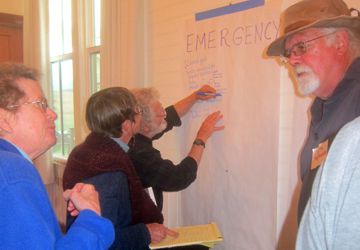
|
| resources from the conference:
|
|
